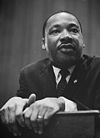- Poor People's Campaign
-
Organized by Martin Luther King, Jr. and the Southern Christian Leadership Conference, the Poor People's Campaign addressed the issues of economic justice and housing for the poor in the United States[1] King said, “We believe the highest patriotism demands the ending of the war and the opening of a bloodless war to final victory over racism and poverty”[2].
Contents
Purpose
Jobs, income and housing were the main goals of the Poor People’s Campaign. The campaign would help the poor by dramatizing their needs, uniting all races under the commonality of hardship and presenting a plan to start to a solution[3]. Under the "economic bill of rights," the Poor People's Campaign asked for the federal government to prioritize helping the poor with a $30 billion anti-poverty package that included a commitment to full employment, a guaranteed annual income measure and more low-income housing[4]. The Poor People’s Campaign was part of the second phase of the civil rights movement. While the first phase had exposed the problems of segregation, King hoped to address the "limitations to our achievements" with a second, broader phase[2].
Planning and strategy
Planning for the Poor People’s Campaign began during a five day retreat on November 27, 1967 in Frogmore, South Carolina[5]. King told his aides that the SCLC would have to raise nonviolence to a new level to pressure Congress into passing an Economic Bill of Rights for the nation’s poor. When reporters asked King about the campaign’s tactics, he sidestepped specific details and focused on the moral dimensions of the crisis[5]. The Poor People’s Campaign held firm to the movement’s commitment to non-violence. “We are custodians of the philosophy of non-violence,” said Martin Luther King, Jr. at a press conference. “And it has worked”[2]. King originally wanted the Poor People's Campaign to start in Quitman County, Mississippi because of the intense and visible economic disparity there. On March 18, 1968, King visited the town of Marks, Mississippi. He watched a teacher feeding schoolchildren their lunch, consisting only of a slice of apple and some crackers, and was moved to tears. After King's death, the Southern part of the Campaign began in Quitman County, riding a train of mules to Washington, D.C..[6]
Volunteers and participants
Poverty afflicted a diversity of races, regions and backgrounds. Martin Luther King, Jr. Rodolfo "Corky" Gonzales, and the SCLC recruited from Mississippi to Illinois and people of all walks of life came from across the nation. Most volunteers were women and many had been involved in other civil rights protests. The media often discouraged those within the movement who were committed to non-violence. Instead of focusing on issues of urban inequality and the interracial efforts concerted to address them, the media concentrated on specific incidences of violence, leadership conflicts and protest tactics[7].
Unsuccessful Ending
Martin Luther King, Jr. was assassinated on April 4, 1968. The SCLC and other leaders decided to continue the campaign in King’s honor. A month later on May 12, 1968, demonstrators began a two-week protest in Washington, D.C.. The same month thousands of poor people of all races set up a shantytown known as “Resurrection City.” The city was closed down in mid-June and the economic bill of rights was never passed.
Undeterred, the SCLC organized a protest caravan, driven by mule-power, to work its way down to the Republican National Convention in Miami Beach, Florida in early August. Later that month, the Poor People's Campaign was in town for the turbulent Democratic Convention in Chicago, where the demonstrators got caught in the midst of the extreme violence in the streets surrounding the convention site.See also
References
- ^ Poor People’s Campaign. http://poorpeoplescampaignppc.org/
- ^ a b c Burns, Stewart. To The Mountaintop. New York, NY: HarperCollins Publishers, Inc, 2004.
- ^ Bishop, Jim. The Days of Martin Luther King, Jr. New York, NY: G.P. Putnam’s Sons, 1971.
- ^ To All Souls. “The ill fated second phase of the civil rights struggle.” 2008, April 7. <http://toallsouls.blogspot.com/2007/04/ill-fated-second-phase-of-civil-rights.html>.
- ^ a b McKnight, Gerald. The last crusade: Martin Luther King, Jr., the FBI, and the Poor People's Campaign. Boulder, CO: Westview Press, 1998.
- ^ Amy Bach (2009). Ordinary Injustice: How America Holds Court. New York: Metropolitan Books. p. 133. ISBN 9780805074475.
- ^ Jackson, Thomas. From Civil Rights to Human Rights: Martin Luther King and the Struggle for Economic Justice. Philadelphia, PA: University of Pennsylvania Press, 2007.
External links
- Weekend America: Resurrection City
- March commemorating the 35th anniversary of the Poor People's Campaign
- Memphis Civil Rights Digital Archive
- "Poor People's Campaign", King Encyclopedia
- Class Resurrection: The Poor People's Campaign of 1968 and Resurrection City
- John Blake. King's final crusade: The radical push for a new America. CNN, 2008-04-01
- Poor People's Campaign
Martin Luther King, Jr. Speeches and sermons · Writings · Movements and protests SpeechesWritingsLetter from Birmingham Jail · "What Is Man?"
Movements and
protests1955 Montgomery Bus Boycott · 1960 Nashville sit-ins · 1961 Albany Movement · 1963 Birmingham campaign · 1963 March on Washington for Jobs and Freedom · 1965 Selma Voting Rights Movement · 1965–67 Chicago Freedom Movement · 1968 Memphis Sanitation Strike · 1968 Poor People's Campaign

People FamilyOthersAssassination James Earl Ray · William Francis Pepper · Loyd Jowers · Funeral
Media Film and TVSongsRelated topics Southern Christian Leadership Conference (SCLC) · Martin Luther King, Jr. Day · Lee–Jackson–King Day · Season for Nonviolence · National Historic Site · National Memorial · National Civil Rights Museum · Eponymous streets · Authorship issues · Letter to an Anti-Zionist Friend
Categories:- Conflicts in 1968
- Martin Luther King, Jr.
- Protests in the United States
- Protest marches
- Poverty
- Civil rights movement during the Lyndon B. Johnson Administration
Wikimedia Foundation. 2010.
